 I have to admit something – I didn’t go into my pregnancy thinking this is how I would parent. In fact, I didn’t go into my pregnancy thinking much at all about how I would actually parent. I did, however, go into it with a strong sense of how messed up the whole birthing process had become in Western society and so early on in my pregnancy I focused on that. I read books, articles (scholarly and journalistic), talked to other parents, and did about all I could to brush up on my knowledge of home birth, natural birth, and the history of birth worldwide. Though I knew of some the massive failures and successes of the medical system, I also learned more about the smaller changes and how they have managed to transform birth from an experience of joy to one of fear. I learned about the difference in theory on birth that separates most midwives from most doctors. I learned about the advantages that modern medicine can have when utilized within reason and how for some conditions it is absolutely the best approach, but mostly I learned that women need to feel confident with their bodies and make decisions that they feel comfortable with. At the time I didn’t think this type of information would affect the way I parent, but the seeds of evolutionary parenting were already there and this was the information needed to make it a full blown obsession.
I have to admit something – I didn’t go into my pregnancy thinking this is how I would parent. In fact, I didn’t go into my pregnancy thinking much at all about how I would actually parent. I did, however, go into it with a strong sense of how messed up the whole birthing process had become in Western society and so early on in my pregnancy I focused on that. I read books, articles (scholarly and journalistic), talked to other parents, and did about all I could to brush up on my knowledge of home birth, natural birth, and the history of birth worldwide. Though I knew of some the massive failures and successes of the medical system, I also learned more about the smaller changes and how they have managed to transform birth from an experience of joy to one of fear. I learned about the difference in theory on birth that separates most midwives from most doctors. I learned about the advantages that modern medicine can have when utilized within reason and how for some conditions it is absolutely the best approach, but mostly I learned that women need to feel confident with their bodies and make decisions that they feel comfortable with. At the time I didn’t think this type of information would affect the way I parent, but the seeds of evolutionary parenting were already there and this was the information needed to make it a full blown obsession.
It should be no surprise that the seeds to evolutionary parenting came from my upbringing and it involved aspects I would emulate and those I would rebel against. You see, my mom was involved in the movement to help mothers have a choice in their childbirth (why I have all those copies of Re: Birth to share) and with that came a bit of a view that children need their mother. So she was a stay-at-home mom (which was awesome). She breastfed us on demand until we weaned (all three of us weaned around 3 years of age), including a full year of exclusive breastfeeding. But she didn’t co-sleep with all of us, only my sister (the last child) got that benefit 14 years after I was born. So I had to sleep in a crib and cry for attention. Now, my mom did come get me all the time, but I was in a room on my own from birth. I was also pushed around in a stroller whenever we went out. And while I received touch from breastfeeding and some holding, my mother has always been physically removed (a product of her own upbringing) and so I can’t say I was held very much.
But while reading up on birth, everything was stewing in my brain and heart and I believe my final thoughts were shaped both by what I read about birth, what I had experienced growing up, and what I would read on other parenting practices because of this. Reading how much birth has changed (and not always for the better) obviously triggered the question of how other aspects of parenting have changed. You just have to look at the proliferation of formula to see one of the most fundamental changes – how we feed our children. Somewhere in my readings, and I can’t quite pinpoint exactly when it was, things seemed to crystallize. Not only was I going to breastfeed on demand and for however long my baby wanted to (I still remember being a little surprised that I was the only mom in my prenatal breastfeeding class who declared they planned on breastfeeding until their baby weaned him/herself), but I started to think about other aspects of parenting, like co-sleeping, more.
Thinking historically, I realized that, like natural birth with a midwife, co-sleeping has been the natural way for mothers and babies to sleep for all of human history – until recently and even then only in some cultures (like our Western ones). That had to count for something, right? Throw in sociological accounts and research showing the how co-sleeping helps later independence (or at the last doesn’t harm it) and it seemed like a darn good idea, if done safely. Then there was my personal experience. As I mentioned, my mother did co-sleep with my sister until my sister was around 8 (though in the older years it was just when my sister wanted to come in and that was usually in the middle of the night), and I don’t think it’s a coincidence that in terms of feelings of security and confidence, she puts me and my brother to shame. But of course there was also that fear that is so prominent in our society and I had to get over that, something my husband was wonderful with. He had done a bit of co-sleeping with his son when he was very little and helped assuage my fears over smothering my soon-to-be-child. Of course, doing the research on how to bedshare safely (something we did before she was born) helped a lot. And for all that humming and hawing and looking at Co-sleepers or in-the-bed gadgets, the moment my daughter was born, it all just felt right and we co-slept safely with nothing but us from that moment on.
But not all decisions were made with such logical and well-reasoned intentions. For example, my choice to babywear didn’t come out of a historical perspective or because of the benefits it would have for my baby. That came later. No, I decided to babywear because I thought it would be a kick-ass workout and help me lose the baby weight (didn’t really work, for the record). Of course, like co-sleeping, as soon as my daughter was born, my instinct was to have her close to met at all times and that meant babywearing. And then when I started reading up on all of it, well, that sealed the deal and our stroller was relegated to the role of glorified shopping cart without ever holding my daughter. My decision to forgo toys for my daughter for the first three months (anything sent to us went up to the top of the closet) was done partially out of knowing it was best for my daughter, but partially out of sheer annoyance and dislike of most newborn baby toys. (I mean, do I really want to listen to those stupid beeps over and over when I know it’s not helping her and was actually only serving to over-stimulate her?) Of course, she got minimal toys at 3 months, but by then we knew what she liked (i.e., anything with music) and which ones she had no use for (i.e., most other things) and we only allowed select toys she could actually manipulate (or provide music to “dance” to) instead of those that provided her with instant gratification.
But all this ignores another very real influence on how I decided to use evolutionary parenting techniques with my daughter – my husband. While I can’t speak to how he came on board with everything, he definitely helped our journey by being as open and willing to listen to my rants and back-and-forths as I delved into the literature to help figure things out. He offered input from his own experiences of what worked and what didn’t and, unlike so many parents, he was able to be unbelievably practical and honest about his previous experiences parenting. This meant he was open to change and didn’t have to maintain that how he did things before was the only way to do things. But most of all, he offered unconditional support.
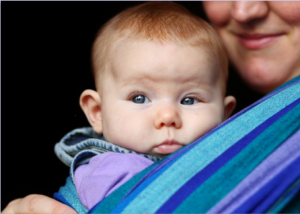 So… while I may not have gone into my pregnancy thinking much about parenting, by the time my daughter was born, I had learned more than I ever intended and had a pretty clear plan laid out. I don’t know how most other people come to their parenting decisions. I’m sure many read “expert” books, many turn to their own parents, and some just wing it. (I never read an “expert” book as I had better information at my fingertips with journals of actual research and sociological accounts of how other cultures do it and am beyond grateful for that information which is why I try to share it here.) I do think that people should do some research, even if just to know a bit more about the choices you’ve made (but even better to do the research before the choice has been made). For having done that legwork early, I can safely say that I have zero regrets about any of my decisions and know that I can defend my choices with research, cultural and historical perspectives, and a happy, healthy, intelligent, vibrant little girl.
So… while I may not have gone into my pregnancy thinking much about parenting, by the time my daughter was born, I had learned more than I ever intended and had a pretty clear plan laid out. I don’t know how most other people come to their parenting decisions. I’m sure many read “expert” books, many turn to their own parents, and some just wing it. (I never read an “expert” book as I had better information at my fingertips with journals of actual research and sociological accounts of how other cultures do it and am beyond grateful for that information which is why I try to share it here.) I do think that people should do some research, even if just to know a bit more about the choices you’ve made (but even better to do the research before the choice has been made). For having done that legwork early, I can safely say that I have zero regrets about any of my decisions and know that I can defend my choices with research, cultural and historical perspectives, and a happy, healthy, intelligent, vibrant little girl.
If you would like to share your story about how you came to be an evolutionary parent (or whatever you call your parenting, if anything) the way you did, I’d love to post it. Please write it up and send it to tracy@evolutionaryparenting.com.

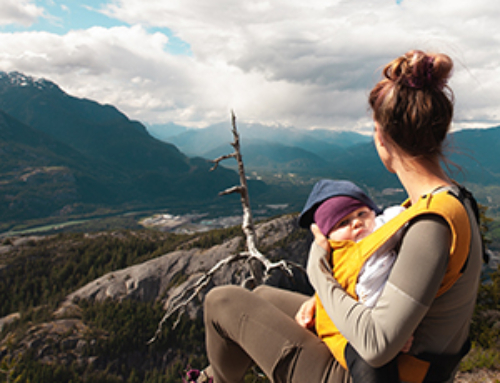

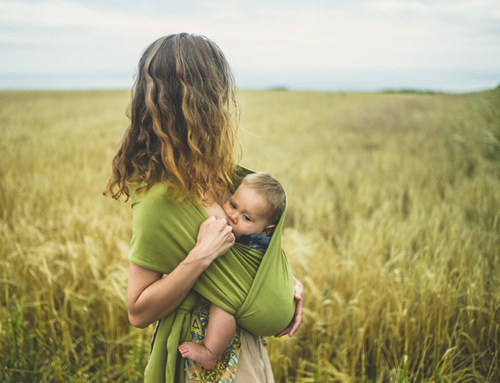
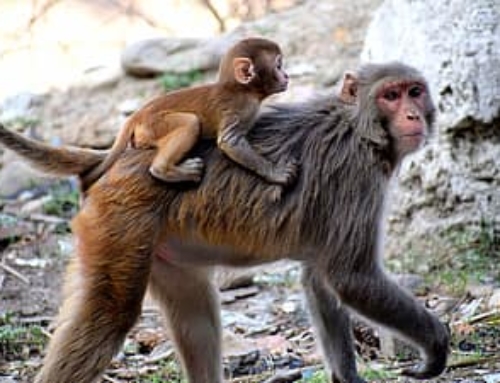
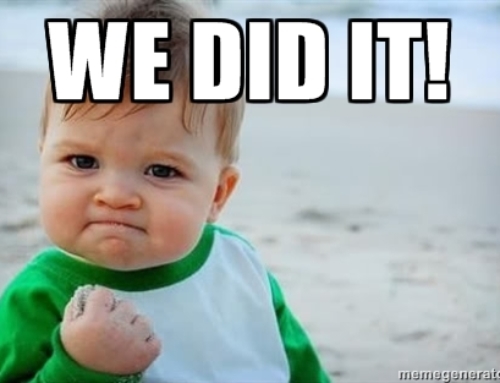
Happy birthday! I am a chiropractor and have done a fair bit of training in paediatrics so I guess this shaped my view on things like breastfeeding and the best kind of baby carrier. I bought a co-sleeping crib on a friend’s advice but when it came to putting my son in it I couldn’t bear to! He has slept with us ever since. My husband has been wonderfully supportive. I have to say I’ve judged people on extended breastfeeding before and am profoundly sorry for that. I want to go down the self-weaning route but think it will take a lot of confidence and bull-headedness on my part as it just isn’t culturally accepted here in the UK…
Sally – you can do it 🙂 I realize how hard it can be to go against the grain, but knowing it’s best for you son will hopefully make it easier – as will having a supportive husband 🙂
Thanks! Just fear my hubby won’t be quite so supportive of that if he feels people are judging us. Mind you his dad has a daughter with CF who was breastfed til 5 so that will help 😉
I’m sorry I didn’t get by yesterday to say happy birthday! So, happy, belated, birthday!
I was studying (laymen) anthropology, sociology, cultures, and parenting practices from such a young age it always surprises me when others say they didn’t. But then…I brought a Discovery science magazine along for leisure reading on the family camping trip when I was six. 😉 hey, which reminds me, in reference to you having better source material…have you ever heard of (read?) The anthropological study “Ishi in Two Worlds” by Theodora Kroeber? I really enjoyed her laymen’s piece on it (Ishi Last of His Tribe) but have never had a chance to find her more indepth piece. (Anthropology sections in local libraries never seem to have much of a selection)
Btw, my mayawrap ringsling is the same pattern as the one in the picture above!
There’s more to my story than this, but the first book I read (in my teens) the set me on the path of evolutionary parenting was The Continuum Concept (http://www.continuum-concept.org/).